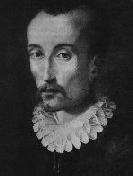![]()
Ecco mormorar l'onde
Torquato Tasso (1544-1595)
![]()

Ecco mormorar l'onde,
E tremolar le fronde
A l'aura mattutina, e gli arboscelli,
E sovra i verdi rami i vaghi augelli
Cantar soavemente,
E rider l'Oriente;
Ecco già l'alba appare,
E si specchia nel mare,
E rasserena il cielo,
E le campagne imperla il dolce gelo,
E gli alti monti indora:
O bella e vaga Aurora,
L'aura è tua messaggera, e tu de l'aura
Ch'ogni arso cor ristaura.
![]()
At the age of twenty-one Tasso entered the service of the Este family of Ferrara, but his association with the house of Este was to be a tragic one. In 1575, after having completed his major works, he suffered the first of a series of nervous breakdowns that very rapidly took the form of furious insanity and required first isolation in the Este palace and a monastery, and later confinement in the asylum of Sant'Anna, where on occasion he had to be kept in chains. Tasso remained at Sant'Anna seven years. Released in 1586, but not fully cured, he spent the rest of his life wandering from city to city, never at peace with himself. He died in Rome, in the monastery of Saint Onofrio.
This poem, like many of Tasso's love poems , was written for a young girl of noble extraction, Laura Peperara, whom Tasso met in Mantua in 1564. The play between the name of Laura and the word "l'aura" - "the breeze" is clear. His main concern was not with thoughts or ideas but with images and words, which he chose with great care and precision primarily for their capacity to captivate the attention with the magic of their sounds. In this respect Tasso is the precursor of "pure" poetry, and many a poet of the nineteenth and twentieth centuries is considerably indebted to him.
Mike Towler, April 1998